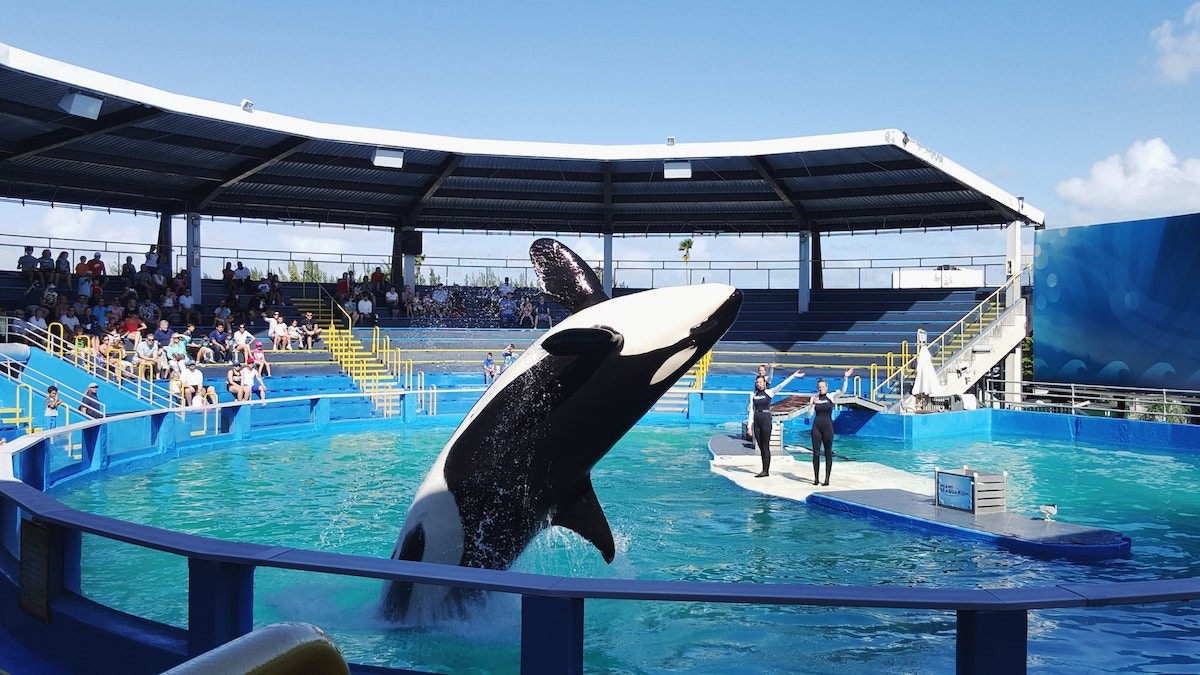Biz That Gives
Lolita the Orca Granted Freedom After 50 Years in Captivity [Video]

Quick Smiles:
- Lolita, an orca held in captivity at the Miami Seaquarium for over five decades, is set to be released and returned to her natural habitat.
- The decision to release Lolita comes after years of advocacy and efforts by animal welfare advocates, with support from all parties involved and approvals from appropriate authorities.
- The pending release of Lolita is seen as a momentous occasion, highlighting the importance of wildlife conservation and the ongoing efforts to protect and preserve marine life for future generations.
The Miami Seaquarium announced plans to move Lolita the orca whale to an ocean sanctuary in her “home waters” after 52 years in captivity.
The Dolphin Company and Friends of Lolita collaborate to work towards Lolita’s relocation, with generous support from philanthropist Jim Irsay. Lolita’s release is celebrated by animal welfare organizations and activists.
The Miami Seaquarium announced on Thursday its plans to move Lolita the orca whale to an ocean sanctuary in her “home waters.” Lolita, also known as Tokitae or Toki, was captured from the Pacific Ocean near Washington and has been in captivity at the Florida park since 1970. Representatives from the Miami Seaquarium were joined at the press conference by The Dolphin Company, Friends of Lolita, and philanthropist Jim Irsay, who is providing a generous contribution to the relocation effort.
The Miami Seaquarium stated that they have begun “the process of returning Toki to her home waters” by creating a legally binding agreement between The Dolphin Company, which recently started managing the Miami Seaquarium, and Friends of Lolita, a nonprofit organization created to help Lolita.
Jim Irsay, owner of the Indianapolis Colts, expressed his enthusiasm and commitment to Lolita’s release, stating that “the story of Lolita has been near and dear to my heart” and that he is proud to play a role in returning her to her native Pacific Northwest.
Lolita, believed to be the oldest orca whale in captivity at approximately 57 years of age, has lived in one of North America’s smallest whale tanks at the Miami Seaquarium. Over the years, her health has been a concern, and a report from the USDA in 2021 criticized the park’s care of the animal, citing that she was fed less than the recommended amount and wasn’t taking in enough water.
However, the new operators of the Miami Seaquarium, The Dolphin Company, reportedly made adjustments to Lolita’s care, and an independent assessment in June found her to be in better health.
The news of Miami Seaquarium’s pending release of Lolita has been celebrated across animal welfare organizations and among activists who have been advocating for her release for many years.
Nicole Barrantes, a wildlife campaign manager with World Animal Protection, expressed relief and excitement, stating, “After 52 years, Tokitae’s time languishing in the smallest orca tank is finally coming to an end. We can’t wait to see her living in the wild under some continued human care, preferably in her home seas where she belongs. To quote the singer Lizzo, it’s about damn time! Now, we must continue fighting for the thousands of other cetaceans who continue to suffer in captivity for tourist entertainment.”
The Miami Seaquarium did not share details about the specific ocean sanctuary where Lolita will be released, but it hopes to relocate her in the next 18 to 24 months, pending approvals from appropriate authorities.
The Dolphin Company CEO, Eduardo Albor, expressed his commitment to giving Lolita a new home and peaceful future, stating, “With the support of all parties, the continued health of Lolita, and approvals from the appropriate authorities, we are all committed to giving this beautiful orca a new home and peaceful future.”
The pending release of Lolita from the Miami Seaquarium marks a heartwarming chapter in her story, with hopes for a brighter future in her natural habitat. It is a momentous occasion for animal welfare advocates and supporters of Lolita’s release who have worked tirelessly for many years to see her return to her natural habitat and live a free and fulfilling life.
As we eagerly anticipate the day Lolita swims freely in her home waters once again, it serves as a reminder of the importance of wildlife conservation and the ongoing efforts to protect and preserve our precious marine life for generations to come.
Source: People

-

 Cute Animals6 months ago
Cute Animals6 months agoPuppy Love Patrol: Service Dog Swoons Over K9 Officer Neighbor
-

 Cute Animals10 months ago
Cute Animals10 months agoHugs, Hooves, and Happiness: Newborn Donkey Steals Hearts by Demanding Affection [Video]
-

 Cute Animals9 months ago
Cute Animals9 months agoWATCH: A German Shepherd’s Surprising Parenting Instinct for Lost Ducklings!
-

 Cute Animals11 months ago
Cute Animals11 months agoPetty Pup Pulls Off Hilarious Bone Heist [Video]
-

 Heroes8 months ago
Heroes8 months agoA Lost Dog’s Bark Leads to a Lifesaving Discovery
-

 Cute Animals10 months ago
Cute Animals10 months ago“Pure Love”: Adopted Rescue Dog Can’t Hide How Grateful He Is [Video]
-

 Cute Animals9 months ago
Cute Animals9 months agoAdorable Puppy Steals Hearts After a Tiring Swim [Video]
-

 Cute Animals10 months ago
Cute Animals10 months agoTiny but Mighty: Cat with Dwarfism Becomes Internet Star as Owners Adapt Backyard for Her Comfort